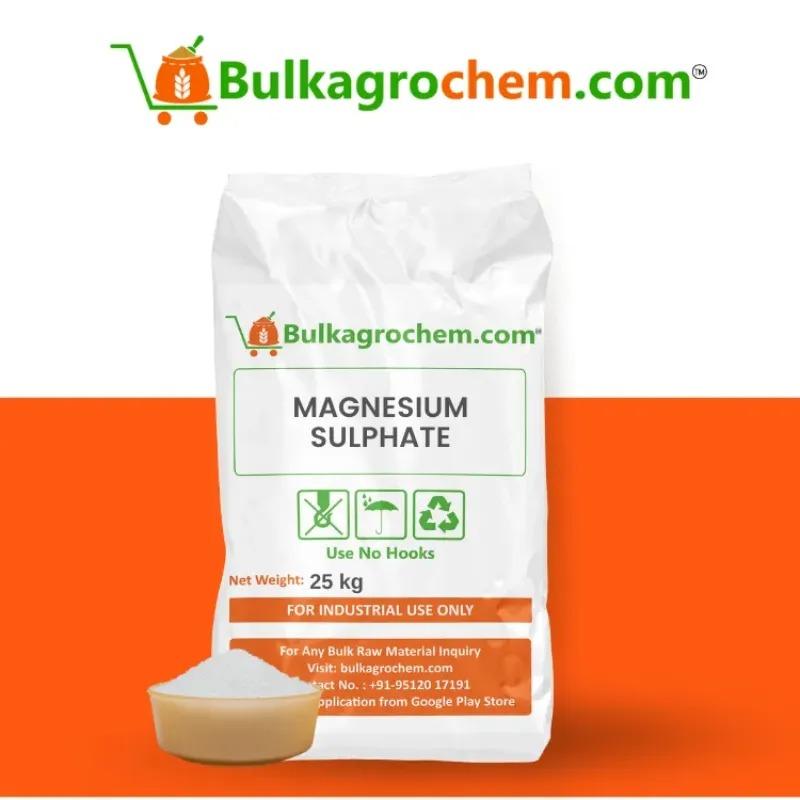Magnesium Sulphate: The Essential Nutrient for Healthier Plants and Higher Yields

What is Magnesium Sulphate?
Magnesium sulphate, commonly known as Epsom salt, is a vital agricultural compound composed of magnesium, sulfur, and oxygen. It is widely used as a fertilizer to provide essential nutrients to plants, promoting healthy growth and development.
Why is Magnesium Sulphate Important for Plants?
Magnesium sulphate plays a crucial role in plant health due to its key components:
-
Magnesium (Mg):
- Central to chlorophyll production, the pigment responsible for photosynthesis.
- Facilitates enzyme activation for metabolic processes.
-
Sulfur (S):
- Vital for protein synthesis and the formation of amino acids.
- Enhances nutrient uptake and overall plant vigor.
What are the Physical Properties of Magnesium Sulphate?
- Appearance: Crystalline solid or powder.
- Color: White or colorless.
- Solubility: Fully soluble in water, ensuring easy absorption by plants.
- Shelf Life: Typically 2-3 years when stored in a dry and cool place.
What are the Benefits of Using Magnesium Sulphate in Agriculture?
- Improved Photosynthesis:
- Enhances chlorophyll synthesis, boosting energy production in plants.
- Prevents Nutrient Deficiencies:
- Addresses magnesium and sulfur deficiencies, ensuring balanced plant nutrition.
- Promotes Root Development:
- Stimulates healthy root growth, improving water and nutrient absorption.
- Enhances Flowering and Fruiting:
- Encourages the formation of flowers and fruits, leading to higher yields.
- Increases Resistance:
- Strengthens plants against environmental stressors like drought and salinity.
Which Crops Benefit from Magnesium Sulphate?
Magnesium sulphate is suitable for a wide range of crops, including:
- Cereal Crops: Wheat, rice, maize, barley, and oats.
- Fruits: Mango, banana, apple, guava, pomegranate, and citrus fruits.
- Vegetables: Tomato, potato, spinach, cabbage, and cucumbers.
- Oilseeds and Pulses: Groundnut, soybean, chickpea, and mustard.
- Other Crops: Sugarcane, cotton, ornamental plants, and turf grass.
How to Apply Magnesium Sulphate?
1. Foliar Spray:
- Dilution Ratio: Mix 2-3 grams of magnesium sulphate per liter of water.
- Application: Spray evenly on the foliage during the early morning or late evening.
- Frequency: Apply every 15-20 days during critical growth stages.
2. Soil Application:
- Dosage: Apply 5-10 kg per acre, depending on the crop and soil conditions.
- Method: Mix with soil or irrigation water for uniform distribution.
3. Hydroponics:
- Concentration: Add 1-2 grams per liter of nutrient solution.
- Usage: Ideal for hydroponic and soilless cultivation systems.
When Should Magnesium Sulphate Be Used?
-
During Chlorosis Symptoms:
- If leaves turn yellow while veins remain green, magnesium deficiency is likely.
-
At Flowering and Fruiting Stages:
- Ensures optimal nutrient supply for fruit and flower development.
-
In Sandy or Acidic Soils:
- Such soils often lack sufficient magnesium and sulfur, making supplementation essential.
What are the Signs of Magnesium Deficiency in Plants?
Plants lacking magnesium exhibit the following symptoms:
- Yellowing of Leaves: Known as interveinal chlorosis.
- Poor Growth: Stunted plant development and reduced vigor.
- Leaf Curling: Older leaves may curl or develop necrotic spots.
- Low Yields: Fewer flowers, fruits, and seeds.
What are the Precautions While Using Magnesium Sulphate?
- Proper Dilution: Avoid using undiluted magnesium sulphate to prevent plant stress.
- Timing: Apply during cooler parts of the day to maximize absorption.
- Storage: Keep in a dry, cool place, away from moisture and direct sunlight.
- Compatibility Check: Do not mix with strong acids or alkaline solutions without expert advice.
Why Choose Magnesium Sulphate Over Other Fertilizers?
- Dual Nutrient Supply: Provides both magnesium and sulfur in one product.
- Water Solubility: Fully dissolves in water for easy application.
- Eco-Friendly: Leaves no harmful residues in the soil or environment.
- Cost-Effective: Offers an affordable solution for correcting nutrient deficiencies.
How Does Magnesium Sulphate Boost Crop Yields?
- Improves nutrient efficiency, ensuring plants utilize available resources.
- Enhances root and shoot growth, leading to robust plants.
- Promotes healthy flowering and fruiting for higher productivity.
- Strengthens resistance against diseases and environmental stressors.
What are the Applications Beyond Agriculture?
Apart from farming, magnesium sulphate is used in:
- Gardening: Enhances the growth of flowers, vegetables, and lawns.
- Horticulture: Ensures the health of ornamental plants and shrubs.
- Aquaculture: Provides essential nutrients for aquatic plants and algae.
Is Magnesium Sulphate Safe for the Environment?
Yes, magnesium sulphate is environmentally friendly. Its natural components decompose easily without leaving harmful residues, making it a sustainable choice for agriculture.
How Does Magnesium Sulphate Compare with Other Nutrient Sources?
- Versatility: Suitable for all types of soils and crops.
- Efficiency: Quickly corrects deficiencies due to its water-soluble nature.
- Cost-Effectiveness: Affordable and widely available.
What are the Key Features of Magnesium Sulphate?
- 100% Water Soluble: Ensures easy absorption by plants.
- Long Shelf Life: Can be stored for extended periods.
- Immediate Results: Quickly addresses nutrient deficiencies.
- Eco-Friendly: Safe for soil, plants, and the environment.
Where Can You Buy High-Quality Magnesium Sulphate?
Magnesium sulphate is available at agricultural supply stores and online retailers. Choose trusted brands to ensure quality and efficacy.
Why is Magnesium Sulphate Essential for Sustainable Farming?
Magnesium sulphate supports sustainable farming practices by:
- Enhancing soil fertility without harming the environment.
- Reducing the dependency on chemical fertilizers.
- Promoting long-term soil health and crop productivity.
Conclusion
Magnesium sulphate is a vital nutrient for ensuring healthy plant growth and high yields. Its dual role as a magnesium and sulfur source makes it indispensable for agriculture and gardening. By incorporating magnesium sulphate into your farming practices, you can achieve sustainable and productive cultivation, ensuring better results for both crops and the environment.
- Art
- Causes
- Crafts
- Dance
- Drinks
- Film
- Fitness
- Food
- Spiele
- Gardening
- Health
- Startseite
- Literature
- Music
- Networking
- Andere
- Party
- Religion
- Shopping
- Sports
- Theater
- Wellness




